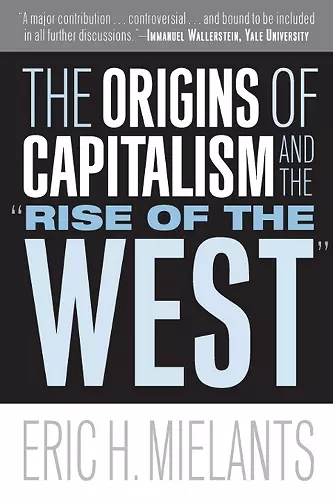The Origins of Capitalism and the "Rise of the West"
Format:Paperback
Publisher:Temple University Press,U.S.
Published:15th Mar '08
Currently unavailable, and unfortunately no date known when it will be back

Presents an interpretation of the origins of modernity and of capitalism in particular. The author argues that, contrary to established thinking, the "Rise of the West" should not be examined through the lens of Industrial Revolution or of the colonization of the New World but viewed through long-term developments that began in the Middle Ages.Provides a fresh, interdisciplinary interpretation of the origins of modernity in general and of capitalism in particular
"A major contribution to the worldwide debate on the origins of the modern world. It is controversial, encompassing in its survey of the data and the literature, and bound to be included in all further discussions." Immanuel Wallerstein, Yale University "The strength of this book is its careful comparisons among regions and the strong effort to overcome the Eurocentrism that has undeniably been a great plague on our efforts to comprehend and explain the rise of the West." Christopher Chase-Dunn, Department of Sociology, University of California, Riverside "Mielants has pulled together a vast mass of material and challenges hypotheses that have been in danger of being repeated as unquestionable dogmas in some circles." International Socialism "Overall, Mielants' timely book offers a well-thought argument that bucks a popular, ahistorical trend locating the 'rise of Europe' in very specific conditions that emerged only in the 18th or even the 19th century. Summing Up: Essential." Choice "Overall, this is an erudite and concise argument that marshals a massive literature in its defense. The book will appeal to a wide range of substantive interests due to its multi-regional comparative and historical analysis. And regardless of your willingness to agree with Mielants's thesis, you will undoubtedly find it thought provoking... While this is certainly not the last word in this ongoing discussion, it is a worthy entry nonetheless." The International Journal of Comparative Sociology "Mielants makes a noteworthy contribution to the transition debate and more broadly to the historical sociology literature."- March 2009 issue of Contemporary Sociology "[A]n important contribution both to world history and to world-systems analysis... Mielants is able to clear a relatively novel path by assembling a holistic and coherent account that challenges some of them prevailing wisdom regarding why, how, and when capitalism emerged in Europe. In doing so, he provides an intriguing explanation of why Europe ultimately gained ascendance in the world-system."- Journal of World-Systems Research Volume XV, Number 1, 2009 "This small book, on a very big topic, makes a substantial contribution to the debates on which elements of European society were crucial to its later economic and military might... One of the major assets of this book is that despite its brief length, it fully engages in comparisons of European history with developments in North Africa, China and south Asia... Mielants has given us a deeply informed and important new twist on old arguments about the role of merchants and cities in the origins of capitalism. It is an argument that deserves attention and should provoke fruitful debates." The British Journal of Sociology, Summer 2009 "This is a very good book...[Mielants'] documentation is extremely impressive... Mielants's study will be very useful for those who have an interest in understanding the variation in long-term path dependencies of the socio-political-economic configurations of capitalist societies... The cross-disciplinary breadth and range of geographical knowledge of [the] author [is] quite remarkable...highly recommended for scholars interested in the most recent explanations for the development of Western capitalism." Perspectives on Politics, September 2009
ISBN: 9781592135769
Dimensions: 229mm x 152mm x 18mm
Weight: unknown
256 pages